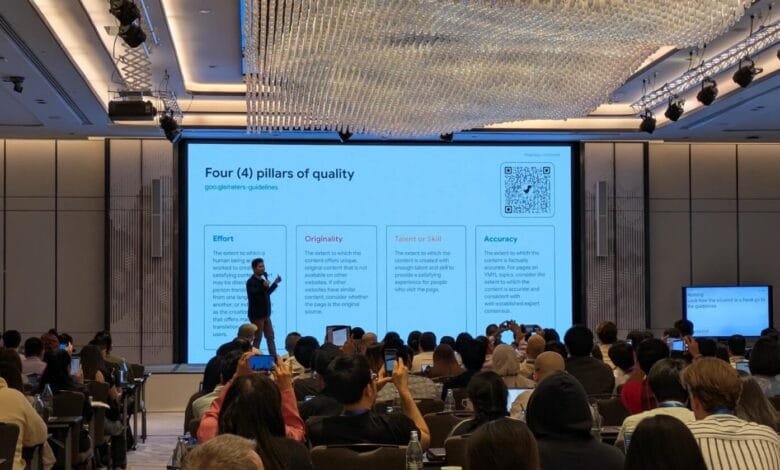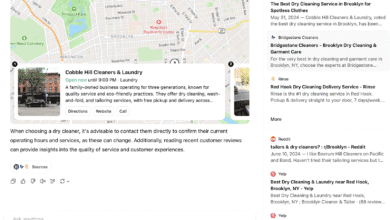Google Search Central APAC 2025: Key Insights from Day 3

▼ Summary
– **Google Search Central APAC 2025 focused on crawling, indexing, and serving search results**, including the launch of the Google Trends API alpha.
– **Google refines queries** by analyzing languages without spaces, removing stopwords, and using contextual synonyms for better relevance.
– **Content quality hinges on trust, expertise, originality, effort, and accuracy**, with trust being the most critical factor.
– **Google updates improve content formats, relevance, and spam detection**, with core updates enhancing overall search result quality.
– **Structured data isn’t a ranking factor** but can enhance search listings; maintaining it ensures eligibility for rich results.
The final day of Google Search Central APAC 2025 wrapped up with deep dives into query understanding, content quality, and the behind-the-scenes mechanics of delivering search results. The event, held in Thailand, provided valuable insights for SEO professionals and content creators looking to refine their strategies for the coming year.
How Google Interprets Search Queries
Cherry Prommawin, a Google representative, explained the complexities of query processing. Not all searches are straightforward. In languages like Chinese or Japanese, where words aren’t separated by spaces, Google must determine word boundaries through segmentation—a process that analyzes past queries and documents to identify where words begin and end.
Once segmentation is complete, Google removes stopwords—common words like “the” or “and”—unless they’re part of a meaningful phrase, such as “The Lord of the Rings.” The system then expands queries using contextual synonyms, which differ from traditional dictionary synonyms. These are derived from real-world search behavior. For example, if users searching for “car hire” frequently click on pages mentioning “rental car,” Google may treat the terms as interchangeable in certain contexts.
This approach, referred to as sibling relationships, helps bridge gaps between user intent and content, even when exact keyword matches aren’t present.
Evaluating Content Quality
Alfin Hotario Ho outlined Google’s criteria for assessing content quality, emphasizing that while it’s just one of many ranking signals, it remains crucial. Google’s Quality Rater Guidelines serve as a benchmark, reflecting the company’s evolving standards for high-quality content. The guidelines focus on four key pillars:
Effort: Content should prioritize users over search engines, demonstrating time, skill, and firsthand knowledge.
Originality: It should offer fresh insights, original research, or unique analysis rather than rehashing existing information.
Talent or Skill: Well-crafted content, free from errors, signals expertise—even if the creator isn’t a formal expert.
Accuracy: Factual correctness, supported by evidence and alignment with expert consensus, is non-negotiable.
Ho also clarified that trust remains paramount, even for topics outside YMYL (Your Money or Your Life) categories. Pages contradicting expert consensus may be flagged as less reliable. Additionally, technical issues like 404 errors or noindex tags don’t inherently impact quality assessments—they’re separate concerns.
Understanding Google’s Updates
Google continuously refines its search systems through updates, which fall into three main categories:
Supporting New Content Formats: As user preferences shift—toward short videos or interactive visuals, for example—Google adapts by introducing new search features to meet demand.
Improving Content Breadth and Relevance: Core updates enhance ranking algorithms to surface higher-quality results, especially in oversaturated topics.
Combating Spam: Targeted updates address loopholes exploited by low-effort or manipulative content.
For those affected by updates, Google advises focusing on improvement rather than “recovery.” Analyzing competitors and refining content strategies often yields better long-term results than quick fixes.
Structured Data Myths Debunked
Google dispelled several misconceptions about structured data:
Not a Direct Ranking Factor: While structured data can enhance search listings, it doesn’t directly boost rankings.
No Guaranteed Rich Results: Even with proper markup, Google’s algorithms decide when to display enhanced features.
Automatic Enhancements Possible: Google may generate rich snippets—like breadcrumbs—without structured data if page content allows.
Requires Maintenance: Regular checks ensure structured data remains error-free and eligible for search enhancements.
Final Takeaways
The event reinforced that successful SEO in 2025 hinges on understanding user intent, prioritizing quality, and staying adaptable to algorithmic shifts. For professionals, revisiting the full three-day coverage—Days 1 and 2 covered crawling, indexing, and the new Google Trends API—can provide a competitive edge.
As search evolves, one truth remains: content crafted for people, not algorithms, stands the best chance of thriving.
(Source: Search Engine Journal)




